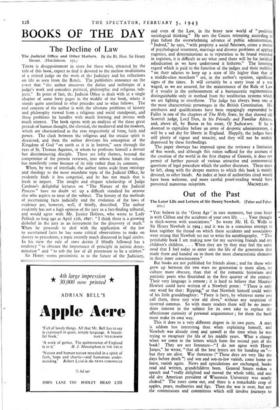BOOKS OF THE DAY
The Decline of Law
The Judicial Office and Other Matters. By the Rt. Hon. Sir Henry Slesser. (Hutchinson. 15s.)
THERE is disappointment in store for those who, attracted by the title of this book, expect to find it devoted to the mellow meditations of a retired judge on the work of the Judiciary and his reflections on life as seen from the Bench. The publishers announce on the cover that " the author discusses the duties and technique of a judge's work and considers political, philosophic and religious sub- jects." In 'point of fact, tht.t Judicial Office is dealt with in a single chapter of some forty pages in the middle of the book, where it stands quite unrelated to what precedes and to what follows. The real concern of the author is with the ultimate problems of history and philosophy viewed from a religious and social standpoint, and thesg problems he handles with much learning and invests with much interest. The book opens with an analysis of the three great periods of human thought, the classical, the mediaeval and the modern, which are characterised as the eras respectively of form, faith and power. The clash between the religious and the secular spirit is discussed, and then the author develops his conception of the Kingdom of God " on earth as it is in heaven," seen through the eyes of St. Thomas Aquinas, of whom he professes himself a devout but discriminating disciple. These are lofty themes, beyond the competence of the present reviewer, into whose hands the volume has manifestly come because of its title rather than its contents.
When, by way of interlude, the author turns aside from ontology and theology to the more mundane topic of the Judicial Office, he evidently finds it less congenial, and he has not much that is fresh to impart. The insight and elegant scholarship of Judge Cardozo's delightful lectures on " The Nature of the Judicial Process " have no doubt set up a difficult standard for anyone else who aspires to treat of the subject. The history of the methods of ascertaining facts judicially and the evolution of the laws of evidence are, however, well, if briefly, described. The author evidently has not a high opinion of the jury as a fact-finding tribunal, and would agree with Mr. Justice Holmes, who wrote to Lady Pollock so long ago as April 15th, 1897: " I think there is a growing disbelief in the jury as an instrument for the discovery of truth." When he proceeds to deal with the application of the law to ascertained facts he has some critical observations to make on slavery to precedents, a topic recently much discussed in legal circles. In his view the rule of stare decisis if blindly followed has a tendency " to obscure the importance of principle in juristic deter- mination " and " to rob the law of all pretension to be a science."
Sir Henry seems pessimistic as to the future of the Judiciary,
and even of the Law, in the brave new world of " positivist sociological thinking." He sees the Courts retreating according to plan before the overwhelming advance of public administration. " Indeed," he says, " with property a social function, crime a matter of psychological treatment, marriage and divorce problems of applied eugenics, and determinations as to reputation to be found recorded in registers, it is difficult to see what need there will be for juridical adjudication as we have understood it hitherto." The lessening regard which is paid to the function of the judges and their inability "on their salaries to keep up a state of life higher than that of a middle-class merchant" are, in the author's opinion, significant signs of the times. It will certainly be a sorry issue of a war waged, as we are assured, for the maintenance of the Rule of Law if it results in the enthronement of a bureaucratic regimentation distinguishable only in method from the totalitarian systems which we are fighting to overthrow. The judge has always been one of the most characteristic personages in the British Constitution. His attributes and qualifications have been engagingly expounded by Fuller in one of the chapters of The Holy State, by that shrewd old Scottish judge, Lord Dun, in his Friendly and Familiar Advices, and, above all, by Bacon in his essay, Of ludica:ure. If he is doomed to capitulate before an army of despotic administrators, it will be a sad day for liberty in England. Happily, the judges have still plenty of vigour and tenacity, and they will not be unduly depressed by these forebodings.
The paper shortage has imposed upon the reviewer a limitation of 800 words, and although this ration sufficed _for the account of the creation of the world in the first chapter of Genesis, it does not permit of further pursuit of various attractive and controversial questions of legal procedure which the author discusses. These must be left, along with the deeper matters to which this book is mainly devoted, to other hands. An index at least of authorities cited would have been welcome, and more careful proof-reading would have


























 Previous page
Previous page